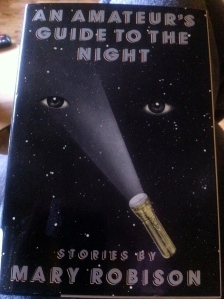
Robison is one of my absolute favourite short fiction writers. The New Yorker started publishing her stories in 1977 and she’s the author of four short story collections and four novels, despite famously suffering from extreme writer’s block in the 1990s . Her writing is pared right back – there are no showy lines or grand plots – and her stories have devastating power.
Yours, from the 1981 collection An Amateur’s Guide To The Night (Alfred A Knopf, Inc), is a case in point. When I reached the end of its three and a half pages, I felt that the air had been sucked from my lungs. In the story, Allison, a 35-year-old, is married to Clark, a much older man. The set-up, as in most of Robison’s stories, is mundane. It’s Hallowe’en and the couple are carving pumpkins on their back porch. Clark is more skilled at this than his wife, although he tries to convince Allison hers are better. In the early hours of the morning, they finish carving and go to bed.
And then the story changes gear, working up to this potent and unexpected paragraph:
‘At the telephone, Clark had a clear view out back and down to the porch. He wanted to get drunk with his wife once more. He wanted to tell her, from the greater perspective he had, that to own only a little talent, like his, was an awful, plaguing thing; that being only a little special meant you expected too much, most of the time, and liked yourself too little. He wanted to assure her that she had missed nothing.’
Robison has that incredible skill of pinpointing feelings and thoughts you didn’t know you had. I love her work. I have another standout favourite Robison story, but I’ll share that with you another time.

